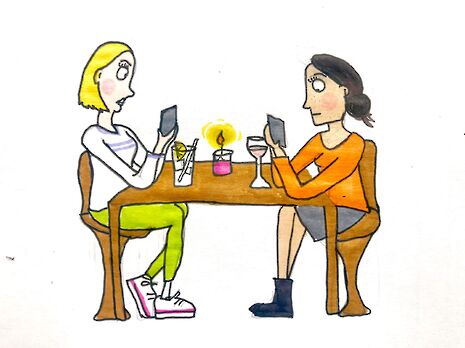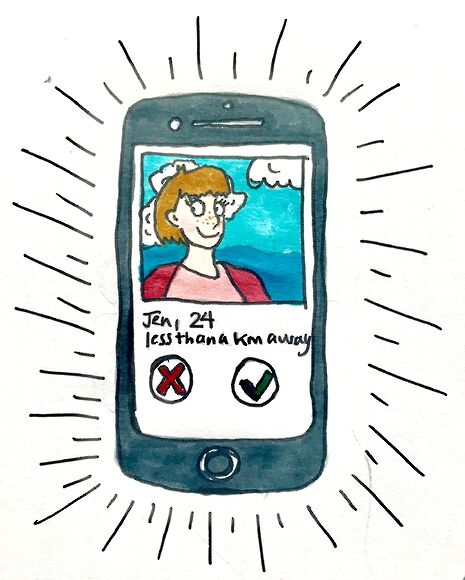Connection has never been easier, so why is dating this hard?
The internet can aid our dating lives, but how real are relationships conducted through screens?

Theoretically, dating has never been easier. The swipe-right world that we live in means we can secure a Saturday night date by effectively just twiddling our thumbs. A selection of flattering photos showcase a smiley individual with an active social life, while in reality The Swiper vegetates alone on the couch, staring down at a phone from an expressionless face balanced on several chins (not speaking from experience). A token bio is enough to satisfy our fleeting concerns about this being a somewhat superficial endeavour. Hook-up apps have given us the power to convince people we’re sexy without even getting out of our PJs. I’m calling this a win, right?
Well, perhaps not. The technology which makes it so easy to meet people can actually make resulting interactions all the more difficult. Both Tinder and texting are riddled with complications, such that they might hinder romance just as much as they facilitate it.
In fact, it is this very ease of online interactions that can undermine them: there are 50 million of us on Tinder, with 12 billion swipes per day – we are all infinitely replaceable. When one match is no longer quite ticking all the boxes, an army of right-swipers are waiting in reserve to fill their place. This on-tap quality of dating apps has the potential to make us act carelessly and callously with regard to our interactions. A fellow Swiper recently reported that she’d finally arranged a date with a Tinder match she’d been chatting to for weeks. The day of the date rolled around; he stopped replying to her messages and unmatched her. With no mutual friends or connections, there’s no-one to hold you accountable for this type of cold-hearted behaviour, and you can dip out of engagements as easily as you can enter into them.
Perhaps it is the very lack of effort required to match or chat with someone online that results in a lack of investment in the interaction itself. The amount we care about something tends to equal the effort we put into it, and vice versa: if you’ve busted a gut for an assignment or a sports match, you care that much more about the result. Now let’s return to our image of The Swiper: those twiddling thumbs are really working hard. If effort and care go hand in hand, then does the casual, easy nature of texting and swiping confirm and reinforce our lack of care for these interactions?
“You can, literally, keep someone at arm’s length by conducting a relationship largely through text”
And yet, despite the seemingly superficial nature of text messages, so many of us agonise over their wording and meaning. Only last week I was sitting with a friend, dissecting a text message with our mental scalpels to try to reveal the meaning beneath the words. It’s so easy to forget the relative unimportance of texts; words on a screen alone don’t always serve as proof that someone cares about you, however deep you dig.
Perhaps we also feel the need to scrutinise our text messages due to their inherent ambiguity. Texts are so easily misconstrued; without body language or tone of voice, a simple “okay” could be read as angry, excited, or apathetic. Occasionally this can lead to slapstick hilarity, but on a more daily basis it results in angst and over-analysis. Similarly, people themselves can come across differently. It seems that our texting styles and our personalities don’t always match up, and an excessive use of the full-stop tends to lend itself to assumptions that you’re serious and angry. Whereas a joyful, and excitable person is often constructed from the frequent use of the exclamation mark! Of course!

Punctuation is not the only pointer we use to guide us through the fog of romantic texting. The number of kisses at the end of a text, goodnight messages or lack thereof, emojis, and length of time to reply are all clues used to decode the meaning of the mysterious words. These replace the traditional aforementioned codifiers of language, tone of voice and gestures, which are so blatantly lacking in what has potentially become our primary channel of communication. In the gloriously dated rom coms of the ’80s, we see women decide the fate of a relationship based on the three day rule: if he hasn’t called you back in three days, he doesn’t care. Nowadays, three hours left on ‘read’ is interpreted by anyone in much the same way. Shockingly, these pointers are far from fail safe, and end up sending us round in circles rather than guiding us through the fog.
Possibly the scariest aspect of our online relationships is the loophole they create for the less emotionally available among us. You can, literally, keep someone at arm’s length by conducting a relationship largely through text, thereby avoiding all the ‘scary stuff’: commitment, rejection, effort. I spoke to someone online everyday for 4 months before we finally found ourselves in the same city, met up, and things were over after the first encounter. Was it too real? Was it too much like hard work? Am I a massive catfish? Whichever the answer, there undoubtedly appears to be a growing trend of apathy among young people towards real-life relationships. If you conduct your relationships the virtual way for too long, can the real way become too scary, and entail too much effort? Can The Swiper take over the real you?
The number of teenagers having sex has fallen for the first time since the baby boomers. Generation Z are ushering in a new era where the comfort, safety, and ease of having phone sex from your own bed beats the real deal. But does it? How real are the relationships conducted through screens?
Online interaction can of course be beneficial: it facilitates and encourages communication, can make long distance bearable, and eases the stress of making plans and meeting up. Not to mention the good stuff: the fun snapchats, the “this made me think of you” texts, the tags in posts that make you giggle. The internet is essentially a new plane on which relationships operate. It’s another dimension to romantic interaction which throws up many an obstacle, but which equally provides many an opportunity for communication and affection. Navigating the minefields of Tinder and texting can at times seem frightening and futile. But used as an additional dimension to relationships, rather than a replacement of face-to-face interaction, the internet can have an enriching potential. So type, Skype, and swipe away. Just don’t swipe away reality in the process.
 News / CUP announces funding scheme for under-represented academics19 December 2025
News / CUP announces funding scheme for under-represented academics19 December 2025 News / Cambridge welcomes UK rejoining the Erasmus scheme20 December 2025
News / Cambridge welcomes UK rejoining the Erasmus scheme20 December 2025 News / SU reluctantly registers controversial women’s soc18 December 2025
News / SU reluctantly registers controversial women’s soc18 December 2025 Film & TV / Timothée Chalamet and the era-fication of film marketing21 December 2025
Film & TV / Timothée Chalamet and the era-fication of film marketing21 December 2025 Comment / Yes, I’m brown – but I have more important things to say22 December 2025
Comment / Yes, I’m brown – but I have more important things to say22 December 2025









